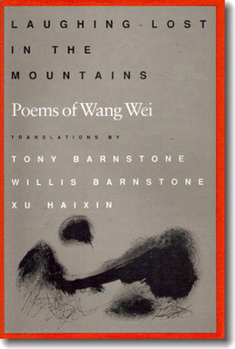Laughing Lost in the Mountains: Poems of Wang Wei
Select Format
Select Condition 
Book Overview
Wang Wei was one of the most celebrated poets of China's Tang Dynasty (618-907). An influential painter and practitioner of Chan (Zen) Buddhism, many of his poems contain concise and evocative descriptions of nature whose elegant minimalism offers subtle expression of a transcendence from everyday life. While this purity of poetic expression is what Wang Wei's reputation is built upon, he lived a courtly life of highs and lows in a tumultuous era,...
Format:Paperback
Language:English
ISBN:0874515645
ISBN13:9780874515640
Release Date:January 1992
Publisher:University Press of New England
Length:244 Pages
Weight:0.90 lbs.
Dimensions:0.7" x 6.0" x 9.0"
Customer Reviews
3 ratings
"There are silent words deep in hill water, a long whistle over the summits."
Published by Thriftbooks.com User , 14 years ago
The Tang dynasty almost always gets pitched as the golden age of Chinese poetry. As much as I'm mildly skeptical of such sweeping characterizations for obscuring as much as they reveal, the poetry of Wang Wei included in "Laughing Lost in the Mountains" provides compelling evidence in favor of this particular generalization. Not that Wang's poetry is as dramatic or charismatic as his better-known peers Li Po or Du Fu. There is a different kind of talent at work here, one that is at once quietly meditative and down to earth, attracted to a hermit lifestyle in the countryside and yet unable to spurn the busy social life of the big city entirely, keenly aware of and yearning for the transcendent especially as it finds expression in the landscapes of nature but still humorously human, all too human. Wang Wei is too honest a poet ever to entirely resolve the tension one way or the other, a tension most of us can probably acutely relate to, and herein lies one key to the subdued power of his work. Then too, his uncanny ability to step back and let his richly observant descriptions of the natural world do his talking for him as an implied presence takes advantage of the syntax of Chinese poetry but to an ironically distinct and personally unique level. Certainly the pervasive influence of Buddhism and Daoism is at work here, and Wang makes no bones about that, but this same trait oddly and, well, somewhat accidentally gives his poems a modern edge. As translations go, the collective work by the father and son team of Willis and Tony Barnstone together with Xu Haixin is superb. Sailing between the Scylla of literal accuracy and the Charybdis of literary readability is always the translator's bane, especially when it comes to poetry, but the results of their labor here strike about as fine a balance as possible. At no point do you get the sense that they're taking unnecessary liberties with Wang Wei's poems and playing fast and loose for the audience, but they do manage with great sensitivity to render them into English as compelling poems in their own right. You're not left guessing why this is great poetry and considered classic, as is sometimes the case. Annotations are sufficient while unobtrusive. The critical introduction is excellent too, giving the reader the necessary biographical and cultural context for the poems in a manner that is at once respectful and yet politely demurs from repeating some of the pious commonplaces that have attached themselves to Wang Wei and his poetics. Their handling of Wang's deep and abiding interest and participation in Buddhism, especially Chan (Zen) Buddhism, does ample justice to the strong religious element in his writing without making a premature Buddha of the man. At times they do rather push their comparison of Wang Wei with the Spanish poets Antonio Machado and Saint John of the Cross just a tad too persistently, though the insight itself seems mostly sound. Their personal account of Wang Wei's vicissitude
Wang Wei, China's nature poet
Published by Thriftbooks.com User , 18 years ago
A beautiful book full of nature poems by the chinese poet Wang Wei, this book contains over 170 wonderful poems, including the complete Wang River sequence. One of the best translations of Wang Wei's poems. If you want a more detailed history of this poets life, get the book 'Wang Wei' by Marsha L Wagner. I highly recommend both books.
An Awesome Book of Poetry
Published by Thriftbooks.com User , 23 years ago
The publisher hit all the key points, so I'll just say a quick few words. Wang Wei is one of my favorite poets, he paints like DaVinci and moves you like Mozart. Reading his work takes you to a whole new world.A great escape, and a great way to spend an afternoon. Get this book! You will be pleased, guranteed!





